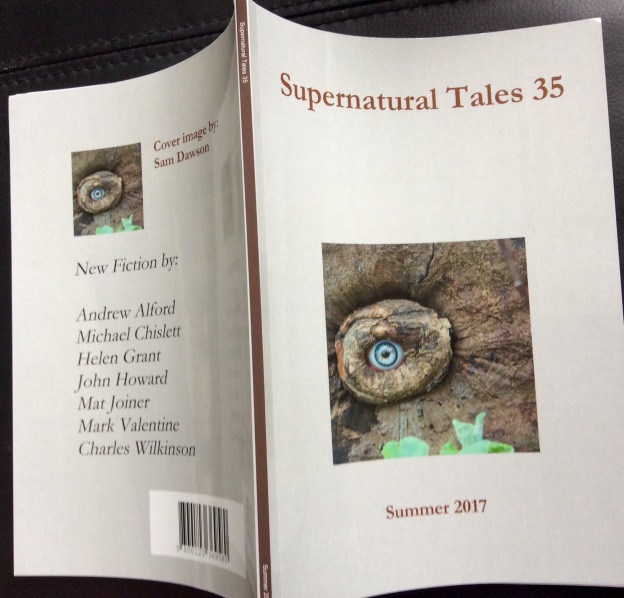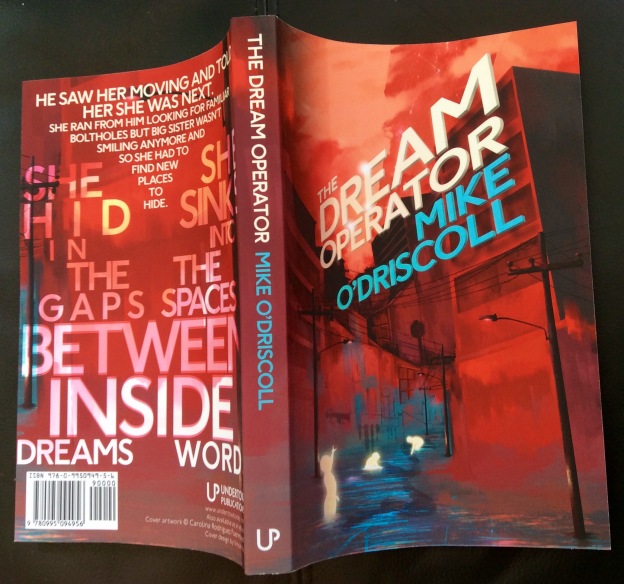Supernatural Tales 35

Summer 2017
Editor: David Longhorn
Stories by Charles Wilkinson, Mark Valentine, Andrew Alford, Michael Chislett, Mat Joiner, John Howard, Helen Grant.
When I review these stories, my comments will appear in the thought stream below…


“It’s ground rent day.”
Or ground hog day? A miniature hedgehog version of it, I say!
I was going to say how CW’s work reminds me of so and so and this and that, but CW really reminds me more of CW himself, and this work is delightful, even caricatural, yes, optimal CW, based on my supertomal survey of his work so far as linked from the above by-line link. No way to describe this unique, haunting work other than as CW-like or Wilkinsonian. Meanwhile, Bernard Hutt (huts are abodes as much as cottages are abodes, subject to freehold, leasehold or this new concept of absolute possession while straddling the Welsh border.) Authors have authority, but I have often given them inferred freehold over their narratives, their narrator or protagonist’s POV being leasehold, and any review of an author’s work needs to pay at least a peppercorn rent to link the absolute possession of some arcane deity who resides ABOVE even the author in authority and what is told below such a deity and beyond any intentional fallacy. I could go on and on about such literary theories as inspired by this work, but suffice to say Bernard, who corks and then uncorks a bottle of vintage wine, becomes a cog in this narrative as he has always been in life while there exist large forces that conspire to divide spire and church from each other. And best to have gone to work in a garage than have aspired to become something better, better, yes, but impossible to attain, like absolute possession of knowledge or of a wife who later left you for an Uruguayan Air Force officer.
A hedgehog as small as a peppercorn, by the way. Fee simple.
“…the graceful white crescent of late Victorian houses was said to have been visited by Delius, who had once played two violin sonatas by lamp-light in one of their sea-view rooms,”
But, apocryphal to this story’s account, each sonata cancelled out the other one. And neither are now part of his known canon of sonatas, I am sure. Meanwhile, we read of the narrator who went to that town and described its off-the-wall nature to us so evocatively and wittily – and of the bookshop there he visited as part of his conspiracy to safeguard books that had small print runs and thus not likely to be known to the grasping net and thus saving at least some books from being converted to the electronic Babel of that net. I am, of course, sympathetic to that aim. And this is an account of one book that the narrator obtained in the shop safeguarding HIM, by dint of a strange retinal imprint of itself upon the wall (a scene as if created beyond the narrator’s own grasp, beautifully characterised by Valentine in his meticulously stylish, traditional, often slightly absurdist way), indeed safeguarding the narrator, perhaps in naïve confusion as to the nature of the electronic net, from another book he had obtained in the same shop. Or so I infer the narrator inferred. The otherwise gratuitous nature of the ending is sublime. I only hope this dreamcatcher review, using the net, avoids entrammelling the gaze of unwelcome eyes towards this wonderful story.
“Its whispers were shreds of paper pulled through a spiralbound notebook.”
The title alerted me to Trump. And indeed I can imagine Trump’s own phantom limb tweeting.
I happen synchronously to be already real-time reviewing a new Rhys Hughes book here alongside this book. This story reminded me of Rhys Hughes fictionatronics but while his stories usually have an instinctively intrinsic core of sanity regarding the otherwise insane flow of his conceits, this Alford does not seem to have any sanity about it at all. A Story Identity Disorder apotheosised. But it’s growing on me.
“His words, like his shadow, were being shredded into fret.”
A literally chilling visit, in the mean time of January, to the pleasaunce in Greenwich. Two men previously known to each other, sharers in esoterica and rituals, one infers, each a feisty combatant as well as colluder in shadows. Almost friends In rivalry. And there is an atmospheric dark Socratic discussion on the hoof about their own shadows as well as the smears and stains of trees etc, around them. Existential angsts, notwithstanding. I was listening to very strange Scott Walker Bish Bosch music as I read it. A synergy of word and sound I recommend. And real-time reviewing takes on a new meaning when a story is divided into two by issues of a magazine, as this seems to be, leaving me pent and strung up. A story and its shadow? (Good job I have already taken a subscription starting with this issue.) There is even an inferred tweet of negation from Trump’s leg in the previous story… “Nibbled at me, like mice on cheese. There’s a metaphor for you!”
“A scrap of Eliot came back to him: I can connect nothing with nothing.”
JB Priestley, too, who loved Dunne, if not Donne. And a mention of Harry Lime as literally came through the door at the same time just now (an Amazon Prime Sunday delivery) a book by Graham Greene, my next real-time review. Peake, Jocelyn Brooke, an end dedication to John Howard (who also follows this story) and no wonder there are writers textured into this text, as this story is about a city library, the old one that is here being exhumed (even while it is being demolished), rebuilt by wilful-dream construction amid the uttering of dust, and limbs growing heavy like brutalist concrete…
A non-phantom limb like Alford’s as part of this chapbook’s pattern? A mouse in the old wainscoting.
I recently visited Birmingham’s NEW library and I killed my own time in there. The old library, though, is the one that preceded it and is tied up with others who were part of its gestalt, people as well as living books, and Stephen and his work, loves and life are tied up with it, a hope and an insouciantly desperate power, symbolised by meeting some ancientecture-constructing pilgrims (disguised as old workmates in and outside the library), one of them a haunting woman with a black bookmark. There are some wonderful expressions here, gist and genius loci, and dust as grist to this sometimes nightmarish mill of mind over matter. A matt joiner.
A major work, still working.
Library vs library.
“…throwing their shadows in front of them.”
A visit from a ghost or a sense of finality that someone has gone to whatever happiness living or dead, still alive, but still a ghost, one’s lover returned just to taunt or haunt the fulsome possibilities of twilight – and thus tainting it? Or a genuine return in felt spirit to bolster and reunite, I wondered, the narrator thus wrong in the interpretation of the visitation? You see anything is possible at twilight.
A wonderful relatively short work that has the atmosphere of an ownership’s well-worn house after a spring walk at twilight. The house where the two lovers had lived, till one of them departed, for whatever reason. It has an aching unrequitedness and a sense of the rest of this book, its shadows, its “limb sliced away”, leaving a ‘phantom pain’. The house being continuously rebuilt to house hope, the tending of electronic connections etc and now the silent groans of an old structure. Perhaps the only possibility that twilight has, after all, is the night it becomes? But I question the narrator’s inductive reasoning.
A fine addition to the John Howard canon that I have grown to love as you can see from the above by-line link. His literary, if not literal, house of work. A once empty shell at birth now full, a legacy of words with many visitors. Ghosts or not.
Like those two books, two sonatas, two shadows, two possessions absolute or leasehold, body and limbs, and those two libraries.
“We had wounded each other — grievously.”
“There are holes all over this story, he thought.”
An entertaining well-written yarn of two rogues in a cave, a place where the locals would dare not enter, one rogue slightly more cultural than the other one, in an exchange of greed stemming from the King Midas legend.
It is also the perfect coda to this symphony of stories. A disembodied hand, the ‘exhuming’ of a limb, the solidifying of a limb as in Joiner, the Chislett duo Quixotically tilting at shadows, connection cancelling out connection as in Eliot and other dual negative synergies I have listed above, and the climactic gold of Howard’s twilight.
A blinder.
end